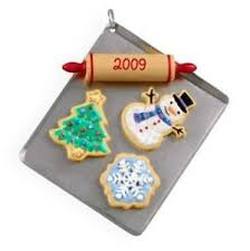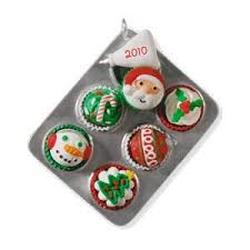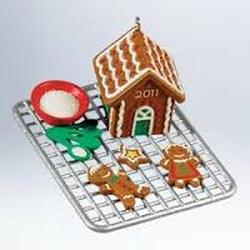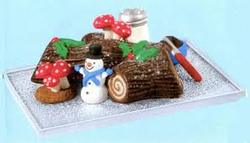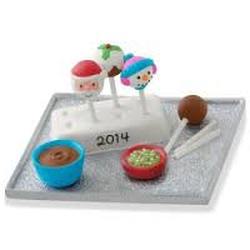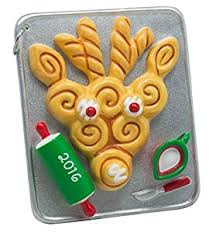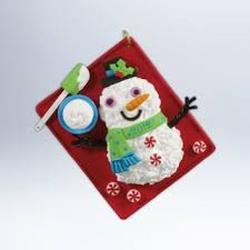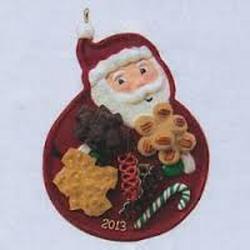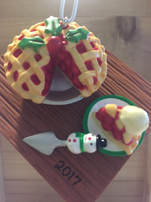The "Season's Treatings" ornament series features freshly baked goods displayed in a festive arrangement. It recalls the generations of family recipes, and shared times together in the family community.
"Season's Treatings" Series
"For I handed on to you as of first importance what I in turn had received: that Christ died for our sins in accordance with the scriptures, and that he was buried, and that he was raised on the third day in accordance with the scriptures, and that he appeared to Cephas, then to the twelve." (1 Corinthians 15:3-5)
For many families, baking Christmas cookies, cakes and other goodies is a traditional holiday activity, handed down from generation to generation. Family receipes are shared, adult children fondly remember the days they spent in the kitchen with mom, or the aunts, or grandma. Remember the smells, that wonderful, heavenly aroma of fresh-baked cookies, hot from the oven, or the fun of decorating the cupcakes - the powdered sugar, the icing, the sprinkles - the mess!
Each item had to be made a certain way. Too much sugar would result in a brown, crunchy thing, too little baking powder and you have a flat, hard pancake, and too little flour gives you a runny, gooey mess. The recipe had to be followed exactly according to the formula that had been handed down, in order to result in the best treats. In other words, the actions of the baker go hand-in-hand with the words of the recipe.
But it doesn't end there. Both the words of the recipe AND the deeds of the baker (and the helpers) have to take place. Would just reading the recipe and dreaming about the cookie satisfy any hungry person? Of course not. On the other hand, baking the exact same cookie that Grandma made is almost impossible without the original recipe. Variations and omissions will inevitably occur, resulting in the creation of something entirely different.
This was exactly the scenario that St. Paul was describing in his letter to the Corinthians. He was not teaching the new Christian church to do something because he just happened to think it was a good idea. Instead, he was handing on the same words (Scripture) and the same deeds (Tradition) that he himself had received from Christ.
As the church, we continue to maintain both the words and the deeds given to us, first from Christ, then from the apostles. We gather in community, because we have been handed on this tradition. In the Mass, we respond to God's invitation through both the Liturgy of the Word, the Scriptures, as well as the Liturgy of the Eucharist, re-presenting the saving deeds of Christ. We are called to share this good news with the world, through the same methods given to us.
So, the next time you're in the kitchen with your kids, take the opportunity to explain how the simple, traditional act of baking those special Christmas goodies can help us to understand so much about how God revealed himself to us, and how he wants us to respond to him, still today. Visit the Strawberry Vine's pinterest account for fun ideas on baking each ornament!
For many families, baking Christmas cookies, cakes and other goodies is a traditional holiday activity, handed down from generation to generation. Family receipes are shared, adult children fondly remember the days they spent in the kitchen with mom, or the aunts, or grandma. Remember the smells, that wonderful, heavenly aroma of fresh-baked cookies, hot from the oven, or the fun of decorating the cupcakes - the powdered sugar, the icing, the sprinkles - the mess!
Each item had to be made a certain way. Too much sugar would result in a brown, crunchy thing, too little baking powder and you have a flat, hard pancake, and too little flour gives you a runny, gooey mess. The recipe had to be followed exactly according to the formula that had been handed down, in order to result in the best treats. In other words, the actions of the baker go hand-in-hand with the words of the recipe.
But it doesn't end there. Both the words of the recipe AND the deeds of the baker (and the helpers) have to take place. Would just reading the recipe and dreaming about the cookie satisfy any hungry person? Of course not. On the other hand, baking the exact same cookie that Grandma made is almost impossible without the original recipe. Variations and omissions will inevitably occur, resulting in the creation of something entirely different.
This was exactly the scenario that St. Paul was describing in his letter to the Corinthians. He was not teaching the new Christian church to do something because he just happened to think it was a good idea. Instead, he was handing on the same words (Scripture) and the same deeds (Tradition) that he himself had received from Christ.
As the church, we continue to maintain both the words and the deeds given to us, first from Christ, then from the apostles. We gather in community, because we have been handed on this tradition. In the Mass, we respond to God's invitation through both the Liturgy of the Word, the Scriptures, as well as the Liturgy of the Eucharist, re-presenting the saving deeds of Christ. We are called to share this good news with the world, through the same methods given to us.
So, the next time you're in the kitchen with your kids, take the opportunity to explain how the simple, traditional act of baking those special Christmas goodies can help us to understand so much about how God revealed himself to us, and how he wants us to respond to him, still today. Visit the Strawberry Vine's pinterest account for fun ideas on baking each ornament!

